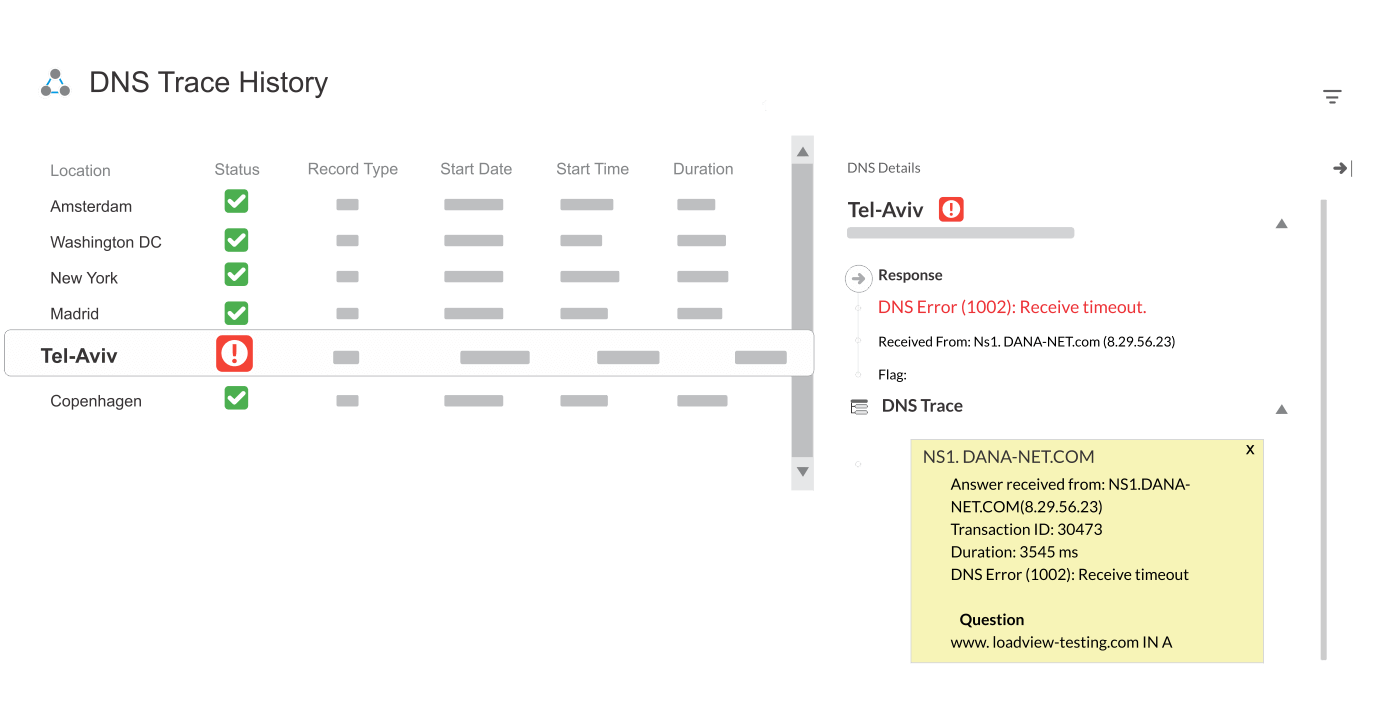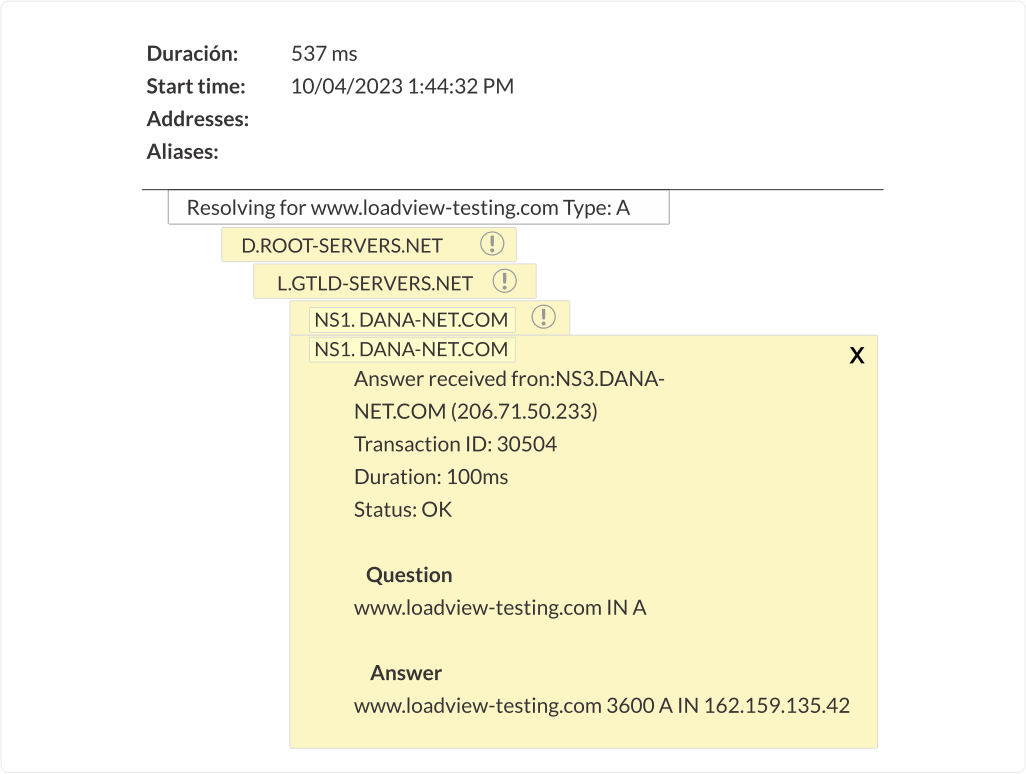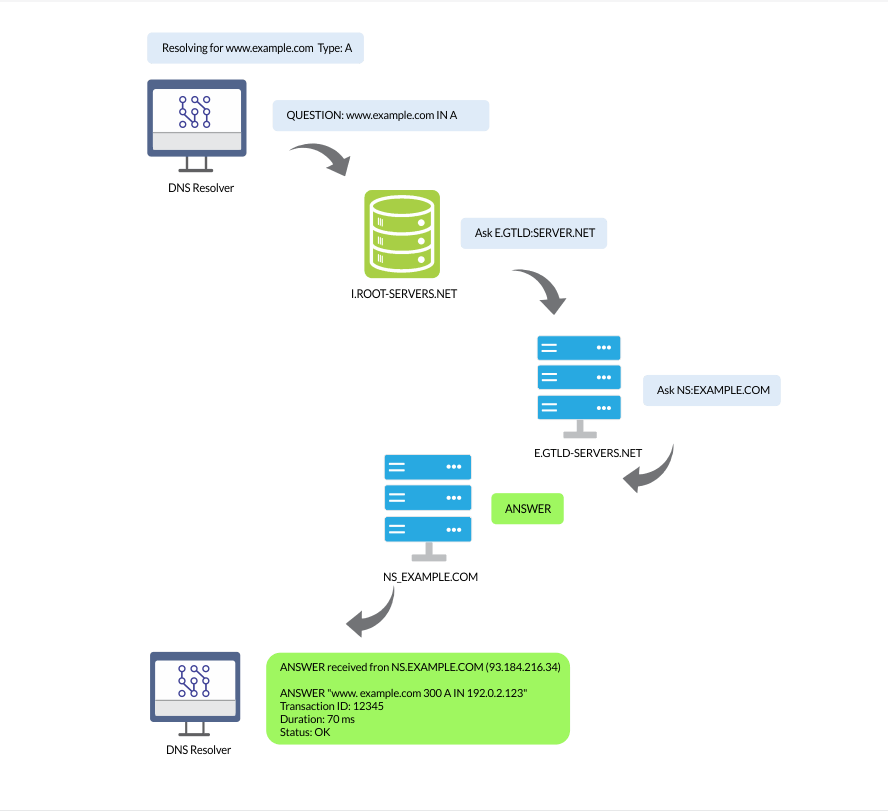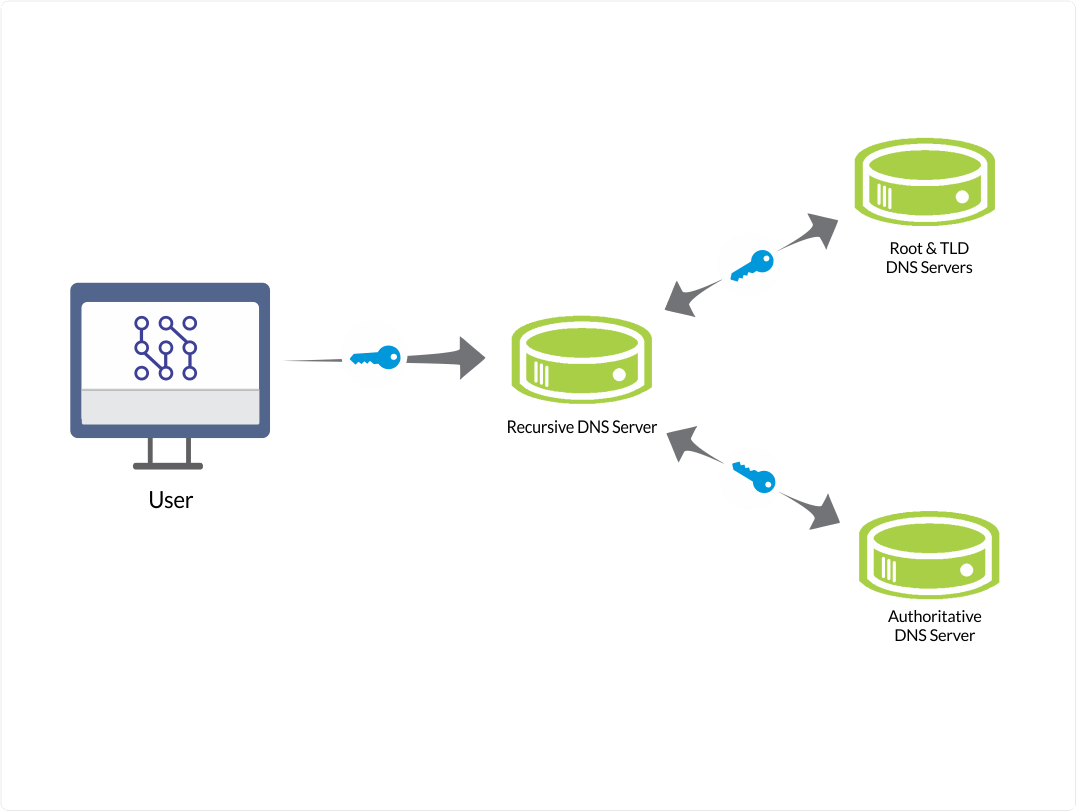- 1-888-479-0741
- sales@dotcom-monitor.com
- Minneapolis, MN, USA
DNS Monitoring
Improve DNS Performance Through Immediate Outage Detection
Instantly detect server downtime, performance issues, and unexpected changes to DNS records with DNS Monitoring. Ensure your domain's availability and performance across global networks with proactive monitoring and real-time alerts. With Dotcom-Monitor, you can receive real-time performance insights, error detection alerts, and flawless DNS monitoring.













Worldwide Insights
Monitor DNS Globally
Operate with confidence as Dotcom-Monitor’s global network of DNS monitoring locations allows you to analyze DNS performance and resolution from critical geographic regions. Our DNS monitoring service helps guarantee your DNS servers respond quickly and accurately to users around the globe.

DNS Monitoring: Track Vital Performance Metrics
Stay ahead and optimize your network with real-time insights and metrics
Response Time Monitoring: Quickly identify and address potential issues.
Query Success Tracking: Ensure continuous DNS availability and consistent performance.
DNS Resolution Accuracy: Guarantee quality of service (QoS) for users by ensuring precise record resolution.
Proactive DNS Monitoring: Ensure Propagation Chain Health
Experience seamless online performance with real-time DNS health snapshots
Real-time Snapshot: Get an accurate real-time view of your DNS infrastructure’s health.
Complete Resolution Path: Track every query and redirection, ensuring thorough monitoring from root servers to the final DNS destination.
Quick Troubleshooting: Instant alerts enable your IT team to pinpoint and resolve issues, minimizing Mean Time To Resolution (MTTR).
Stable Online Presence: Monitor each stage of DNS resolution, ensuring continuous and robust network performance.


Safety and Synchronization Checks: Advanced DNS Monitoring for Maximum Security
Unlock superior DNS security with advanced checks to keep your data safe
DNSSEC Verification: Validate the entire chain of trust in DNSSEC hierarchy to ensure data authentication and integrity.
SOA Consistency: Monitor SOA records for seamless replication and to detect potential discrepancies across DNS servers.
Blacklist Vigilance: Continuous monitoring of domain and IP against blacklists, taking proactive steps to uphold your online reputation.
Guaranteed Accurate Resolution: Prioritize security, synchronization, and reputation for flawless DNS performance.

Powerful Features
Key DNS Monitoring Features
Dive deep into DNS health and performance with these advanced tools and analytics!
Precise DNS Health Snapshots
Empower your IT team with real-time insights into the health and performance of your DNS infrastructure. With our comprehensive monitoring suite, you can ensure timely identification and resolution of potential DNS issues.
Full DNS Resolution Path Tracking
Our state-of-the-art tool tracks every DNS query and redirection from root servers to final resolution. This granular level of monitoring ensures that every step in the DNS resolution process is under your watchful eye.
Immediate Alert System for DNS Anomalies
Stay ahead of potential threats and issues. With our immediate alert system, any anomalies or deviations in your DNS resolution process are instantly flagged, allowing for rapid troubleshooting and issue resolution.
Consistent Domain Accessibility
Our monitoring ensures a robust and stable online presence. By understanding each stage of DNS resolution, you can guarantee maximum uptime and accessibility for your domain.
Comprehensive DNS Propagation Reports
Get in-depth insights with our DNS propagation reports. Analyze the global propagation of your DNS records across multiple servers, ensuring consistent and accurate DNS resolutions for all your users.

Secure DNS Traffic Monitoring
Security is paramount. Monitor all the incoming and outgoing DNS traffic, ensuring any malicious or suspicious activity is detected and addressed promptly.
DNS Load Balancer Health Check
Maintain optimal website speed and responsiveness. Our health checks on DNS load balancers ensure efficient distribution of traffic, providing a seamless user experience.



Trusted by Businesses Around the World
Our customers rely on Dotcom-Monitor to ensure an exceptional experience for their users, helping to retain a high level of trust and loyalty. That’s why we’re committed to ensuring that Dotcom-Monitor exceeds your expectations.
"I'm a network analyst and use Dotcom tools inside the ISP I work, it's a really good and reliable tool for monitoring things along the network, and testing network components, I usually use it to make diagnostics of servers latency, and dns resolve time."

Leonardo J.
IT & Network Infrastructure Analyst
"One of Dotcom's best feature is the push/pull API capabilities that provides us with network performances. We use this to monitor for performance issues as well as page loading stats."

Gregory S.
Manager, Broadcast Media
"The software is easy to setup and helps me track availability of my own app as well as third party apps that are embedded in our product. The configuration setting allow user to control minutest details such as frequency of checks."

Vishal B.
Product Manager, IT & Services
Expert DNS Monitoring. Power and Precision for Businesses of All Sizes.
Harness our cutting-edge platform and expansive global infrastructure to ensure your DNS remains faultless. With real-time notifications and tailor-made dashboards, respond to issues with unmatched speed and accuracy.
Get answers
DNS Monitoring—Frequently Asked Questions
Below are some of the most common questions about DNS monitoring. If you have additional questions, feel free to contact us.
DNS Monitoring is the process of tracking the performance, availability, and accuracy of your Domain Name System (DNS). DNS is the system that translates human-readable domain names into IP addresses which computers use to locate and communicate with each other. If your DNS is down or experiencing issues, users may not be able to access your website or services which could lead to potential downtime, lost revenue, and a negative user experience.
Overall, DNS monitoring provides consistent connectivity to your websites and servers, saving you time when diagnosing DNS issues. DNS monitoring ultimately ensures your critical services are always up and running.
DNS monitoring is critical because it ensures that internet-based applications and services operate efficiently and securely. This ongoing monitoring is essential for network operations (NetOps) professionals who strive to maintain high availability, enhance overall user experience, safeguard against potential cybersecurity threats, and facilitate strategic infrastructure planning. The importance of DNS monitoring spans several key areas:
- Ensuring Uptime and Availability: DNS issues can cause significant disruptions, leading to downtime or inaccessible websites and services. Continuous monitoring of DNS ensures that servers are functioning correctly and responding as expected, minimizing the risk of disruptions that could affect users and business operations.
- Performance Optimization: DNS resolution times are crucial for the smooth operation of online services; even minimal delays can degrade user experience significantly. Regular monitoring helps identify and rectify issues with slow or underperforming DNS servers, thereby improving the speed and reliability of website access.
- Security Enhancements: The DNS infrastructure is a common target for various cyber threats such as DNS spoofing, distributed denial-of-service (DDoS) attacks, and cache poisoning. By actively monitoring DNS traffic and patterns, these threats can be identified early, allowing for timely intervention to mitigate potential security breaches and protect sensitive data.
- Error Detection and Resolution: Incorrectly configured DNS records are a common issue that can lead to traffic misrouting or services becoming unavailable. Regular DNS monitoring allows for the early detection of such configuration errors and other anomalies, making it possible to correct these issues before they impact service availability and user trust.
- Regulatory Compliance and Auditing: Maintaining a secure and robust DNS infrastructure for organizations in regulated industries is not just best practice but a regulatory requirement. DNS monitoring aids in compliance by providing audit trails and evidence of due diligence in network management and security protocols.
- Insights and Analytics: Beyond troubleshooting and security, DNS monitoring can offer insights into user behavior, geographic distribution of traffic, and overall network efficiency. These analytics are invaluable for making informed decisions about service improvements, marketing strategies, and customer engagement.
- DNS monitoring is a cornerstone of modern NetOps, indispensable for ensuring that internet-based services are reliable, fast, and secure. By investing in comprehensive DNS monitoring tools and practices, organizations can significantly enhance their operational resilience and strategic planning capabilities.
You can find DNS monitoring as a part of cloud dns monitoring service. It works by regularly checking if the DNS server responds to all DNS queries. With such type of check, you can initiate DNS queries for a desired hostname and query type – A (for IPv4), AAAA (for IPv6), MX, NS, PTR, or CNAME. There are two scenarios that follow once you set your expected response. The check is marked UP, when the received response is equal to the required expected one. The check is marked DOWN, when the received response is not equal to the required expected one. The DNS monitoring check validates the conditions of DNS servers by sending a DNS request and comparing the received response with the expected one.
To troubleshoot a DNS error, start by reviewing the error details for each server node in the DNS tree. If DNS errors are frequent, consider setting up a separate DNS task with “Verify Response On” set to “First Responding” and monitor the domain’s resolution regularly.
Also, you should investigate areas like network devices, browsers, DNS records, your service provider, and potential latency issues. It’s helpful to have a troubleshooting checklist, starting with the easiest items to review, like network devices, before moving on to more complex issues, such as misconfigured DNS records or latency problems.
Refer to our wiki, to get more information on how to fix DNS errors step-by-step.
The short answer to this is: yes. DNSSEC is a suite of extensions that improve Domain Name System (DNS) security by verifying that DNS results have not been tampered with. Enterprises can use DNSSEC to prevent attacks related to DNS spoofing, DNS cache poisoning, etc.
When DNS was developed, security was not a top priority. Because of this, when sending a request to an authoritative DNS server, the resolver cannot verify the authenticity of the response sent by name servers to clients. The resolver is only able to check if the response comes from the same IP address to which the original request was sent. DNSSEC helps verify the authenticity of DNS responses through digital signatures for DNS records. You can learn more about DNSSEC validation in this knowledgebase article.
DNS monitoring can be useful for detecting outages faster by providing real-time visibility into the DNS infrastructure. DNS Monitoring can detect errors like incorrect IP addresses and assure that outages are not prolonged. The less time your website or service is down, the less your traffic flow is interrupted. It can alert tech teams about issues, such as DNS server failures or network connectivity problems, as soon as they occur. That way, IT teams can quickly identify the root cause of the problem and take action to restore services.
A DNS Monitoring Tool is a tool that automates the process of tracking your DNS performance and instantly alerts you of any issues so that you can resolve them before they affect your users. It ensures that your website remains accessible, your services are reliable, and your brand’s reputation stays intact.
To monitor a DNS server, use a DNS monitoring tool like Dotcom-Monitor that regularly checks DNS records, response times, and query success rates. These tools provide real-time alerts and reports which ensure that any issues are promptly identified and addressed.
Here are some types of DNS queries that can be monitored:
- IP addresses: Compare the IP address received from the system to the IP addresses you provide
- SOA records: Monitor the serial number, which is updated when a change occurs
- MX and SRV records: Monitor these records to prevent loss of communication pathways
- NS records and root servers: Test NS records to ensure no one has tampered with the primary and backup nameserver records
- A records: Map a website’s domain or subdomain to an IPv4 address
- CERT records: Verify the authenticity of a site and deliver encrypted data
- CNAME records: Provide an alias that allows users to use title variations that direct them to the same part of a website
DNS monitoring can help with:
- Diagnosing issues
- Preventing targeted attacks
- Identifying security breaches
- Avoiding unplanned downtime
- Protecting users’ private information
- Protecting revenue
- Protecting brand reputation
Ensure Perfect DNS Resolution with DNS Monitoring
30-Day Free Trail. No Credit Card Required.


